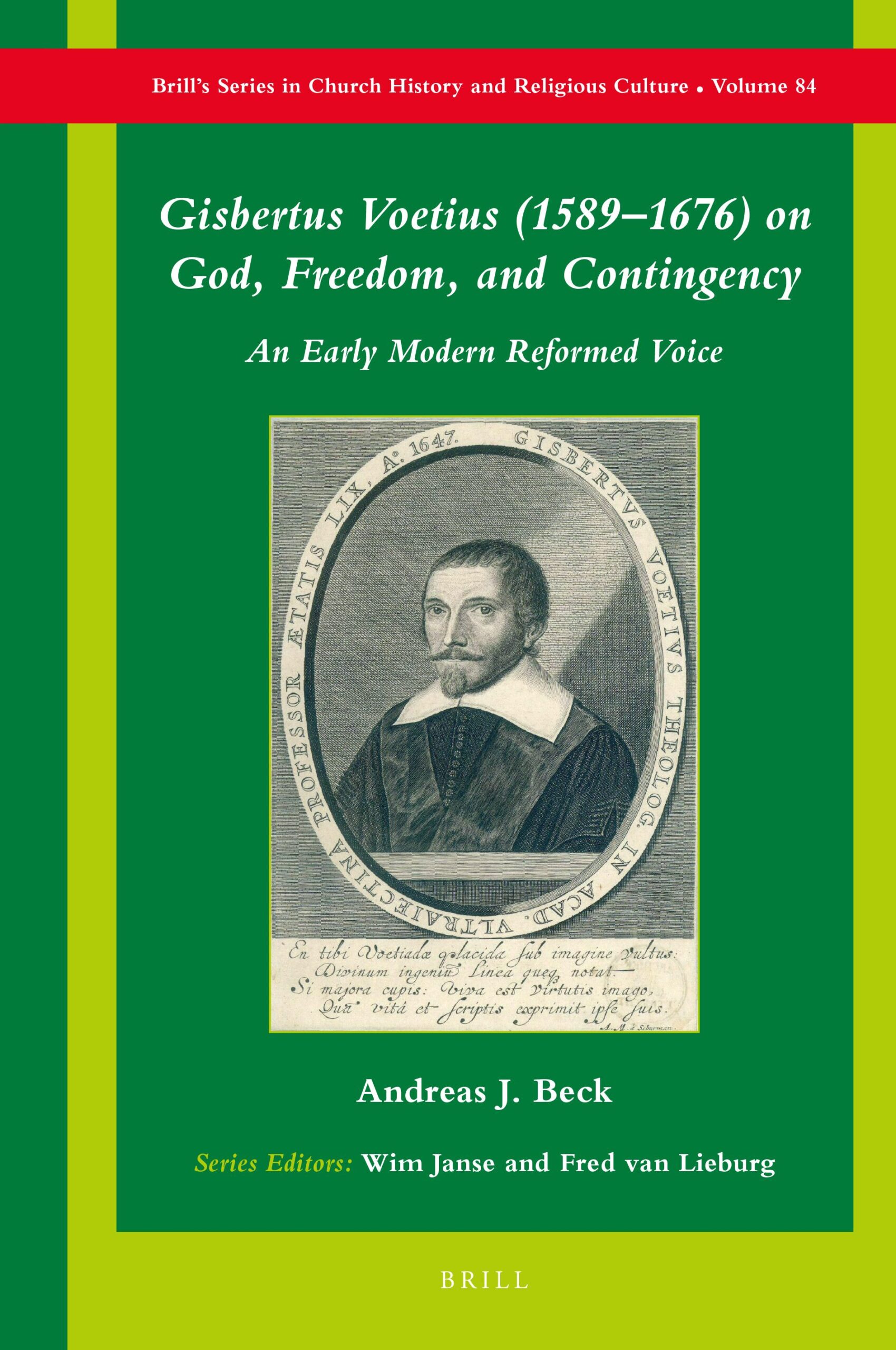Gisbertus Voetius (1589–1676) on God, Freedom, and Contingency: An Early Modern Reformed Voice. Andreas Beck. Brill. 616 pages. $227.
Gisbertus Voetius is undoubtedly one of the principal figures of seventeenth-century Post-Reformation Reformed Orthodoxy. Unfortunately, he is relatively unknown in modern English-speaking Reformed circles. The Dutch theologian was a minister, a professor, and a polemicist, critically engaging with the (in)famous Roman Catholic Cornelius Jansen, the philosopher Rene Descartes, and fellow Reformed theologians such as Samuel Maresius and Johannes Cocceius. He was one of the youngest delegates to attend the Synod of Dordt and published five large volumes of disputations spanning the whole range of theological topics, along with publishing many other smaller texts similarly influential. Twelve of the aforementioned disputations were reprinted in the late 19th century by Abraham Kuyper. Voetius was a leading figure not just in Reformed scholasticism but also in the so-called Dutch Nadere Reformatie (or Further Reformation), a pietistic movement in the latter part of the early modern period. Yet, notwithstanding his popularity among early modern Reformed theologians, not a single monograph in English dedicated solely to Voetius and his theology had been published until Andreas Beck’s 2007 dissertation on Voetius was translated into English under the title Gisbertus Voetius (1589–1676) on God, Freedom, and Contingency.
Beck, a leading historian of Reformed orthodoxy following in the footsteps of the so-called Utrecht school, has been a longtime member of the Werkgezelschap Oude Gereformeerde Theologie or the Classic Reformed Theology Research Group, dedicated to studying early modern Reformed scholasticism. As he makes clear in his introduction, Beck continues in the trajectory of interpreting the Reformed scholastics along the lines sketched out by Richard Muller and Willem Van Asselt (14).
Beck’s book is divided into three parts. Beck spends the first part of the book contextualizing Voetius’ theology. More specifically, Beck helpfully supplies his readers with a nice biographical sketch of Voetius’ personal and professional life. In so doing, Beck outlines every major work of Voetius and summarizes all the significant debates in which Voetius was publicly engaged. Readers who are further interested in such controversies can track down the ample secondary literature Beck cites, if they so desire.
Part two of the book contextualizes Voetius’ doctrine of God within how Voetius imagines the nature and structure of theology more generally. Beck gives an excellent exposition of Voetius’ understanding of innate and acquired natural theology (169–85), by which Voetius concludes somewhat controversially on the basis of the former (innate knowledge of God) that there are no true theoretical atheists.
The bulk of the book (covering part three) is interested in exploring the coherence (as Beck would argue) of Voetius’ doctrine of God alongside his doctrine of creation, given that Voetius affirms, on the one hand, that God is a necessary being ad intra while, on the other hand, his actions ad extra—creation and providence—are free, being dependent upon the divine will. Beck says that for Voetius, “It is necessary that God is the willing God, but what he wills is contingent” (472). Indeed, even the choices of rational creatures are, for Voetius, free and contingent. Navigating the Scylla of necessarianism and the Charybdis of extreme voluntarism, to use Beck’s words (407), Voetius carefully explains how some theological doctrines are grounded upon the divine nature, while others flow from his divine freedom. For example, Voetius argues that given his will to create, God necessarily wills some things based on his own divine nature, such as the command that God is to be rightly worshiped. This right to be worshipped correctly is a necessary right logically antecedent to any act of the divine will. God could not have willed a world in which the first three commandments were not operative. These commandments are necessary given who God is and given his will to create rational creatures (407). However, God wills other things contingently. Accordingly, Voetius, following Duns Scotus (and contra Thomas Aquinas), argues that many other commandments of the Decalogue could be dispensed with by God if he so willed (403–407).
Beck masterfully explains the myriad of scholastic distinctions employed by Voetius in service of explaining the divine nature and its relation to the contingent world order. God’s necessary and free knowledge along with Voetius’ critique of Molina’s doctrine of scientia media (middle-knowledge) is explained in chapter 8. Chapter 9 covers Voetius’ description of how God’s will can be identical with God (360), who is necessary, while at the same time free (380–383). Chapter 11 gives a detailed account of Voetius’ distinction between God’s absolute and ordained power, again tracking closely with Scotus’ own use of the distinction. The last main chapter, chapter 12, deals with the perennial theological/philosophical problem of describing the relationship between the divine decree and human free choice while maintaining the immutability and foreordination of all things together with the contingency of human freedom. Beck argues that Voetius employs the supposed Scotist notion of synchronic contingency, while distinguishing between a necessity of the consequence (or hypothetical necessity) and a necessity of the consequent (absolute necessity) in order to protect true human freedom.
One of Beck’s main conclusions is that Voetius’ whole approach to divine necessity and freedom is distinctly Franciscan or Scotist in structure (479–483), with an emphasis on the divine will as the basis of reality. This is not especially controversial. What is controversial is that Beck simultaneously suggests that Voetius, at times, clearly opts for Thomistic language—even when Scotist language was available!—while simultaneously understanding such language in a Scotist (and hence non-Thomistic) way. He grants, for example, that Voetius opts for the Thomistic distinction between God’s scientia simplicis intelligentiae (knowledge of simple intelligence) and his scientia visionis (visionary knowledge). But after examining how Voetius understands the distinction, he concludes that “this distinction … should not be understood in a strict Thomistic sense, even if Voetius does take the terms as such over from Thomas” (292). Such a move is also used when Beck describes Voetius’ understanding of divine predication. Beck claims that although Voetius exhibits a “formal correspondence” (230, cf. 234) with Aquinas’ understanding of analogical predication, he still has “a nuanced, roughly Scotist form of univocity” (239). This Scotist reading of Voetius has not went unchallenged. Richard Muller, in his 2012 article “Not Scotist,” questions Beck’s reading of Voetius (from the 2007 German dissertation). Noteworthy, this English edition includes some response to Muller’s criticism (239fn.64; cf. also 482).
Regardless of whether one is convinced by Beck’s insistence on the influence of Duns Scotus upon Voetius’ theology proper, his monograph is filled with careful discussion of knotty early modern theological topics. Any student of early modern Reformed orthodoxy will find a vast array of material related to the doctrine of God, both among Voetius and his various interlocutors. The price of the book is hard to justify, but if you work in the field of early modern Reformed orthodoxy, it cannot be ignored.
Author
-

Michael J. Lynch (PhD, Calvin Theological Seminary) teaches language and humanities at Delaware Valley Classical School in New Castle, DE and is a lecturer in Church History at the Davenant Institute. He is the author of John Davenant’s Hypothetical Universalism.
View all posts




